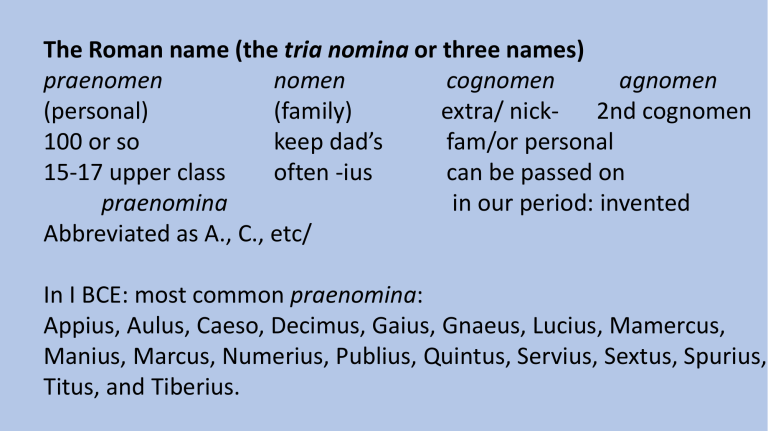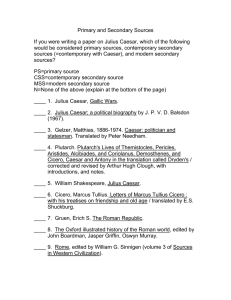
The Roman name (the tria nomina or three names) praenomen nomen cognomen agnomen (personal) (family) extra/ nick- 2nd cognomen 100 or so keep dad’s fam/or personal 15-17 upper class often -ius can be passed on praenomina in our period: invented Abbreviated as A., C., etc/ In I BCE: most common praenomina: Appius, Aulus, Caeso, Decimus, Gaius, Gnaeus, Lucius, Mamercus, Manius, Marcus, Numerius, Publius, Quintus, Servius, Sextus, Spurius, Titus, and Tiberius. Inscription recording Augustus’ restoration of some temples in Greece. Copy. CIL III 6070 = CIL III 7118 = IEphes. 1522 = McCabe. Ephesos. 374 = ILS 97. Inv. No. MCR 276. Rome, Museum of Roman Civilization Imperator Caesar, son of a deified one, Augustus, (when) consul 12th time, (with) tribune’s power for the 18th year, pontifex maximus... Greek: Autokrator Kaisar Theou Yios Sebas…. Praenomen Nomen Cognomen Agnomen Gaius =C. (old sp.) Marius Gaius Iulius Caesar (Curly??) Gaius Mucius Scaevola (story) Gnaeus=Cn. Pompeius Magnus (great one, like Alexander) Marcus= M. Tullius Cicero (warty, chickpea) (Cf. Animal House: Otter, Pinto, Flounder) Strabo = Squinty Publius=P. Vergilius Maro Quintus= Q. Horatius Flaccus (droopy?) -branch Publius Cornelius Sulla, Scipio Nasica Sextus=S. Pompeius Magnus (son) -honor (Africanus, Ovidius Naso (nose!) (Cato)Uticensis) - adoption (below) Titus Pomponius Atticus Marcus Vipsanius Agrippa The Roman name: how it worked • address: praenomen with family name/nomen; • vocative (when you address him) “Gai,” “Marce” • formal: praenomen + either nomen or cognomen (but fashions change) • real formal: M(arcus) Tullius M(arci) f. M(arci) n(epos) Cor(nelia tribu) Cicero Marcus Tullius son of Marcus grandson of Marcus Cornelian tribe Cicero • Hard to tell fathers from sons? It’s a feature, not a bug. (Gustavo Lars-Bertil Pérez Gutiérrez von Eckenstein = Gus Perez, JOH’s Swedo-Columbian best friend from high school) Adoption (freq.): Aemilius+ P. Cornelius Scipio= P. Cornelius Scipio Aemilianus • C. Octavius Thurinus= C. Iulius Caesar Octavianus (later = Augustus) Emperors Vespasian(us), Hadrian(us) • modern: nomen (Vergil, Horace, Pompey) or cognomen (Cicero ([Sallust will say M. Tullius], Founding Fathers called him Tully), Agrippa) • Augustus: C. Iulius Caesar Octavianus (divi filius)>C. Iulius Caesar >C. Caesar Imperator> Imp. (praenomen) Caesar > Imp. Caesar Augustus (new cog.) Emperors lots of names: • Tiberius Claudius Nero • Gaius Julius Caesar Germanicus (= Caligula, a nickname, “Little Army Boots”) • Tiberius Claudius Caesar Augustus Germanicus • Imperator Nero Claudius Caesar Augustus Germanicus Women: originally praenomen + family nomen, but of upper class we hear only family name in feminine: Tullia, Iulia, Octavia, Cornelia, Claudia (maybe Catullus’ Lesbia) = “That woman from the house of ____” (boxer-grillmaker George Foreman: George Jr., George III ("Monk"), George IV ("Big Wheel"), George V ("Red"), and George VI ("Little Joey").) More than one?? Minor, Maior? Tertia, Quintia (the third one, the fifth one)1, 2, Pet names?? Diminutive: Livilla. Don’t “take” husband’s name, but often known as X the wife of Y (not quite “Handmaid’s Tale”) Enslaved persons: just one name, but when freed can have “three names” or two by taking “owner’s” name • Man named Felix, freed by Marcus Aemilius Vitalis, became Marcus Aemilius Felix • Woman named Melissa, freed by Marcus Aemilius Vitalis, became Aemilia Melissa Study of names of important men (prosopography) = study of changing social order. CIL 6.2329 – Epitaph of Claudia Lachne, formerly enslaved, set up by her husband, Philippus Rustianus, a public slave “To the Spirits of the Dead for Claudia Lachne, freedwoman of Antonia Philippus Rustianus, Public slave from the Sacrarium of Divine Augustus, made (this) for his most dear wife and for himself.” SPQR = Senatus Populusque Romanus Senate= all ex-magistrates, office for life limited official role" advice, consult: senatus consultum (“advice of the senate)” People: vote for office and vote on issues vote for office: 3 different assemblies, all people weighted towards vote for issues: plebs (below), Concilium Plebis, Assembly of People presided over by elected tribunes of plebs (sacrosanct, can’t touch this) vote up or down on issues presented (no questions) = law supposed to go through senate for “advice” tribune could veto other Sulla made it dead end Above populus and below senate are equestrians, often v. wealthy. (Don’t need to master all these details in CLAS 122 Magistrates in offices = honores = cursus honorum “sequence of offices” 1 year at a time Age 30+ quaestor, nbd, legisl. assist. , $ matters 20 in our period 39 praetor- civil authority, legal ruling, etc. 6 in our period 42 consul- mil power, civil & criminal jurisdiction, one can veto another, 2 a year Not supposed to be consul two years in a row (until Marius!) Being elected consul makes family “noble,” you a “new man” (Cicero ) Go to province next year, govern, make $ Noble almost means “ruling class” patrician vs. plebeian: sort of ancient history but still felt optimate (respects tradition) vs. popularis: (will use newer methods) dictator: temporary (supposedly!) emergency one-man rule Also, aedile: public works, grain, games (win fame) censor: kick people out of senate (for morals or other reasons) pontifex (maximus), augur: religious positions Reviewing some of Porter readings (from 133-44): Gracchi: reformers, killed Marius: military success, consul repeatedly 91-87 Social Wars (war with Italian allies, socii) Sulla dictator 82-79: proscriptions Pompey fights Spartacus, success in East, young consul Rise of Caesar (pics are Marius, Sulla, Pompey, Caesar) 63 Conspiracy of Catiline (Sallust!) and predominance of Cicero (not much in Porter) (pic = Cic. on R, Cat. On L) 60-59 First Triumvirate (three-man-board) Pompey, Caesar, and rich guy Crassus (informal) • Caesar in Gaul 58ff; enormous mil success, great or evil or both? Killed many many Gauls (or sometimes chopped off hands) • 50’s: violence in the streets • Outbreak of Civil War; JC wants to stay in office & avoid prosecution, Pompey represent Senate (and himself) • 49 Rubicon: little boundary Italy and Gaul (“the die is cast”) • Battle of Pharsalus 48, others 46, 45, pardons many: clementia (mercy) • 44 Caesar killed • JC= ? Loved by people • Great writer, reformed calendar, killed by men he pardoned • Failed? how could you do what JC did and succeed?



